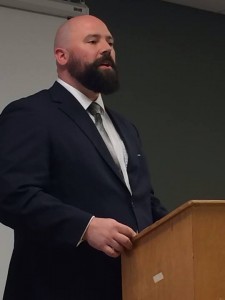 Sooner or later, we all have to deal with critics. The old chestnut goes something along the lines of “but my mom says I’m brilliant,” and so we’ll have to forego any maternal input on our literary efforts in favor of words less warm, but probably more honest. Whether we’re talking about a submission editor’s hasty notes, a mentor’s line-by-line markup, or an Iowa-style “dead author” workshop session, the writer’s job in the face of criticism is to learn from that criticism. It’s a herculean task, but one which you the writer must master since, well, go back and read the first sentence.
Sooner or later, we all have to deal with critics. The old chestnut goes something along the lines of “but my mom says I’m brilliant,” and so we’ll have to forego any maternal input on our literary efforts in favor of words less warm, but probably more honest. Whether we’re talking about a submission editor’s hasty notes, a mentor’s line-by-line markup, or an Iowa-style “dead author” workshop session, the writer’s job in the face of criticism is to learn from that criticism. It’s a herculean task, but one which you the writer must master since, well, go back and read the first sentence.
While it is tempting to rest assured of your own brilliance, know that you dismiss any piece of criticism at your own peril. You’ll get the occasional ill-informed vagary along the lines of “I dunno, I just didn’t like it” or something else equally unhelpful. You’ll often find this sort of criticism in low-level undergraduate writing workshops around midterm and finals weeks, or following a weekend of epic tailgating. No need to really pay that too much attention if you are not so inclined.
But I digress.
Assuming that the critic has indeed read your work, considered it, and wants to offer constructive and helpful notes, it’s important to humble yourself and to listen. Criticism can sting, badly. That’s not quite doing it justice: criticism can make you want to curl up into a ball and never write again. But that’s what happens when you let your ego get in the way of your craft, and if you’re going to write – and, as a consequence, deal with critics – you must let go of your ego.
Some critics are relatively easy to endure – pedants checking your spelling and grammar, for example. Others are easy to dismiss if they are trying too hard to inject their own style matter into your work – the minimalist who insists you could chop your complex character drama down to about the length of a sonnet.
But other criticism cuts deeper. When you’ve had a gaping and irreconcilable plot hole revealed, or if someone should point out that your story so strongly echoes something else already in the world that no publisher would ever show it the light of day. Or that your characterization reveals you to be, or perhaps suggests that you are, sexist, or racist, or misogynistic, or homophobic, or otherwise holding a deep character flaw that perhaps you didn’t even know you had.
When faced with such criticism, it’s important to remember your service to the words – if you’ve been called out over questionable or even hurtful politics, take the time to think about what you’re doing and where you’re coming from. This is the sort of criticism that must not be ignored for both your own sake and, in a very real way, for the sake of the societies and cultures in which we find ourselves. If your work has struck a nerve and offended*, then observe the awesome power that words have in the world, and strive to use that power responsibly.
And of course, sometimes we just have to torch a piece. Perhaps the plot isn’t salvageable, or we realize we have plagiarized something we’ve never read (or at least that’s what our critics say). Cheer up – burn the failure and use the ashes like fertilizer to nourish the next piece. If the worst thing that happens after an encounter with hard criticism is more writing, then consider yourself lucky and get back to work.
*Disclaimer: “You shouldn’t be offended,” “I didn’t mean to offend anyone,” and “explain it to me – how is that offensive?” are not appropriate in this circumstance. If you have offended someone, you listen to what they have to say. Similarly, “I’m being offensive on purpose” is debatable at best, and you’re probably not being as witty as you think you are – people’s failure to “get it” is more likely your failure to deliver it.

